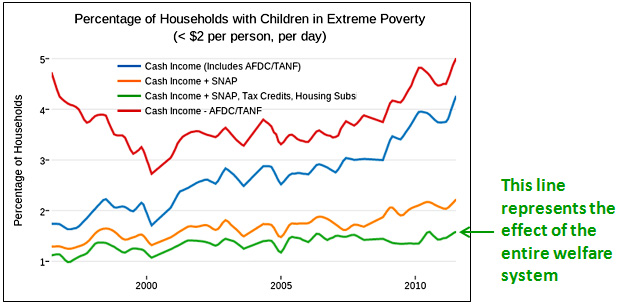A couple of days ago, in a post showing the growth of social welfare spending over the past few decades, I noted that the passage of the 1996 welfare reform act didn’t even show up as a blip. In terms of money spent, it’s turned out to be a non-issue.
This was not meant to be a defense of welfare reform. Believe it or not, I really do try not to write authoritatively about subjects I know little about, and welfare reform is a complicated topic that I’m only glancingly familiar with. I don’t really have either the chops or the desire to relitigate it right now.
However, that post prompted a response that’s probably worth dealing with at least briefly: namely that even if the dollar amount was relatively small, welfare reform did hurt the very poorest. This is a live topic right now because of the recent publication of $2.00 a Day: Living on Almost Nothing in America, by Kathryn Edin and Luke Shaefer. Among other things, Edin and Shaefer focus on the effects of cash, and they note that welfare reform eliminated cash payments to the very poorest, who generally don’t have jobs. This was deliberate: the whole point of welfare reform was to link public assistance to jobs as a way of motivating the poor to find work.
There remains plenty of disagreement about whether this was a good idea. For now, though, I just want to present Edin and Shaefer’s own data about extreme poverty. Here it is:

The green line is the one to pay attention to if you want to know the comprehensive effect of all changes to the social welfare system over the past couple of decades. And what it shows is that the percentage of households with children in extreme poverty increased from about 1 percent to 1.5 percent. That represents an increase of fewer than 500,000 households.
In other words, if we simply handed over $10,000 to every household with children in extreme poverty, it would cost only about $15 billion. Given that we spend about $1 trillion annually on social welfare benefits, this is peanuts. It’s not money that prevents us from addressing deep poverty, it’s political preference. Welfare reform was very deliberately crafted to reduce payments to people who don’t work, and one of the effects of that is a small increase in extreme poverty.
If you want Bernie Sanders to publicly denounce this state of affairs, this is the issue you need to address. To what extent should our welfare system hand out cash to nonworking adults? For how long? With what strings attached? My guess is that Sanders doesn’t really want to dive into this because he knows it’s a big hot button and he doesn’t want to get bogged down in something that takes the spotlight away from his larger economic message. But that’s just my guess.
If you want to read more about this, there’s plenty available. We’ve written about it several times at Mother Jones, including here, here, here, and here. Over at Brookings, Ron Haskins critiques Edin and Shaefer here. They respond here.


















